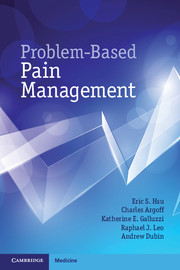88 results
Ten new insights in climate science 2022
-
- Journal:
- Global Sustainability / Volume 5 / 2022
- Published online by Cambridge University Press:
- 10 November 2022, e20
-
- Article
-
- You have access
- Open access
- HTML
- Export citation
Chapter 40 - Postpartum pain
- from Section 4 - Visceral Pain
-
-
- Book:
- Case Studies in Pain Management
- Published online:
- 05 October 2014
- Print publication:
- 16 October 2014, pp 290-296
-
- Chapter
- Export citation
Chapter 39 - Pain in pregnancy
- from Section 4 - Visceral Pain
-
-
- Book:
- Case Studies in Pain Management
- Published online:
- 05 October 2014
- Print publication:
- 16 October 2014, pp 282-289
-
- Chapter
- Export citation
Chapter 38 - Chronic rectal pain
- from Section 4 - Visceral Pain
-
-
- Book:
- Case Studies in Pain Management
- Published online:
- 05 October 2014
- Print publication:
- 16 October 2014, pp 275-281
-
- Chapter
- Export citation
Contributors
-
-
- Book:
- Case Studies in Pain Management
- Published online:
- 05 October 2014
- Print publication:
- 16 October 2014, pp xi-xv
-
- Chapter
- Export citation
Chapter 37 - Patient (male) with chronic pelvic pain from interstitial cystitis
- from Section 4 - Visceral Pain
-
-
- Book:
- Case Studies in Pain Management
- Published online:
- 05 October 2014
- Print publication:
- 16 October 2014, pp 266-274
-
- Chapter
- Export citation
30 - Coccydynia
- from Section 6 - Abdomen and pelvis
-
- Book:
- Problem-Based Pain Management
- Published online:
- 05 November 2013
- Print publication:
- 24 October 2013, pp 152-155
-
- Chapter
- Export citation
39 - Sacroiliac jointpain
- from Section 7 - Spine
-
- Book:
- Problem-Based Pain Management
- Published online:
- 05 November 2013
- Print publication:
- 24 October 2013, pp 204-210
-
- Chapter
- Export citation
6 - Trigeminal neuralgia
- from Section 2 - Head pain
-
- Book:
- Problem-Based Pain Management
- Published online:
- 05 November 2013
- Print publication:
- 24 October 2013, pp 27-31
-
- Chapter
- Export citation

Problem-Based Pain Management
-
- Published online:
- 05 November 2013
- Print publication:
- 24 October 2013
62 - Cancer pain, palliative and end-of-life care
- from Section 9 - Pain syndromes and special topics
-
- Book:
- Problem-Based Pain Management
- Published online:
- 05 November 2013
- Print publication:
- 24 October 2013, pp 353-359
-
- Chapter
- Export citation
52 - Pain in human immunodeficiency virus-related neuropathy
- from Section 9 - Pain syndromes and special topics
-
- Book:
- Problem-Based Pain Management
- Published online:
- 05 November 2013
- Print publication:
- 24 October 2013, pp 288-296
-
- Chapter
- Export citation
16 - Shoulder bursitis and tendinitis
- from Section 3 - Neck and shoulder
-
- Book:
- Problem-Based Pain Management
- Published online:
- 05 November 2013
- Print publication:
- 24 October 2013, pp 72-76
-
- Chapter
- Export citation
Index
-
- Book:
- Problem-Based Pain Management
- Published online:
- 05 November 2013
- Print publication:
- 24 October 2013, pp 368-385
-
- Chapter
- Export citation
19 - Tennis and golfer’s elbow: lateral and medial epicondylitis
- from Section 4 - Upper limb
-
- Book:
- Problem-Based Pain Management
- Published online:
- 05 November 2013
- Print publication:
- 24 October 2013, pp 88-91
-
- Chapter
- Export citation
10 - Cervical radiculopathy
- from Section 3 - Neck and shoulder
-
- Book:
- Problem-Based Pain Management
- Published online:
- 05 November 2013
- Print publication:
- 24 October 2013, pp 46-50
-
- Chapter
- Export citation
49 - Herpes zoster and post-herpetic neuralgia
- from Section 9 - Pain syndromes and special topics
-
- Book:
- Problem-Based Pain Management
- Published online:
- 05 November 2013
- Print publication:
- 24 October 2013, pp 268-274
-
- Chapter
- Export citation
46 - Myofascial pain syndrome
- from Section 9 - Pain syndromes and special topics
-
- Book:
- Problem-Based Pain Management
- Published online:
- 05 November 2013
- Print publication:
- 24 October 2013, pp 243-248
-
- Chapter
- Export citation
33 - Acute and chronic back pain, back strain and sprain
- from Section 7 - Spine
-
- Book:
- Problem-Based Pain Management
- Published online:
- 05 November 2013
- Print publication:
- 24 October 2013, pp 167-179
-
- Chapter
- Export citation
41 - Hiparthritis andbursitis pain
- from Section 8 - Hip and lower limb
-
- Book:
- Problem-Based Pain Management
- Published online:
- 05 November 2013
- Print publication:
- 24 October 2013, pp 217-221
-
- Chapter
- Export citation



